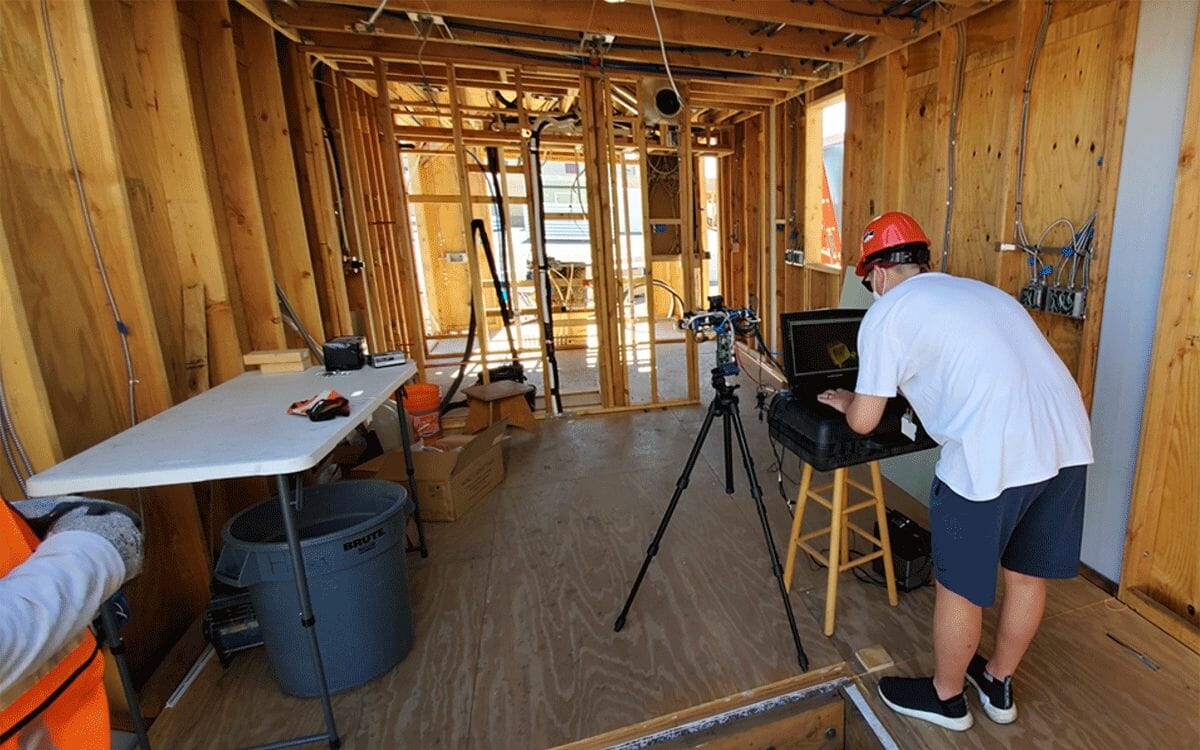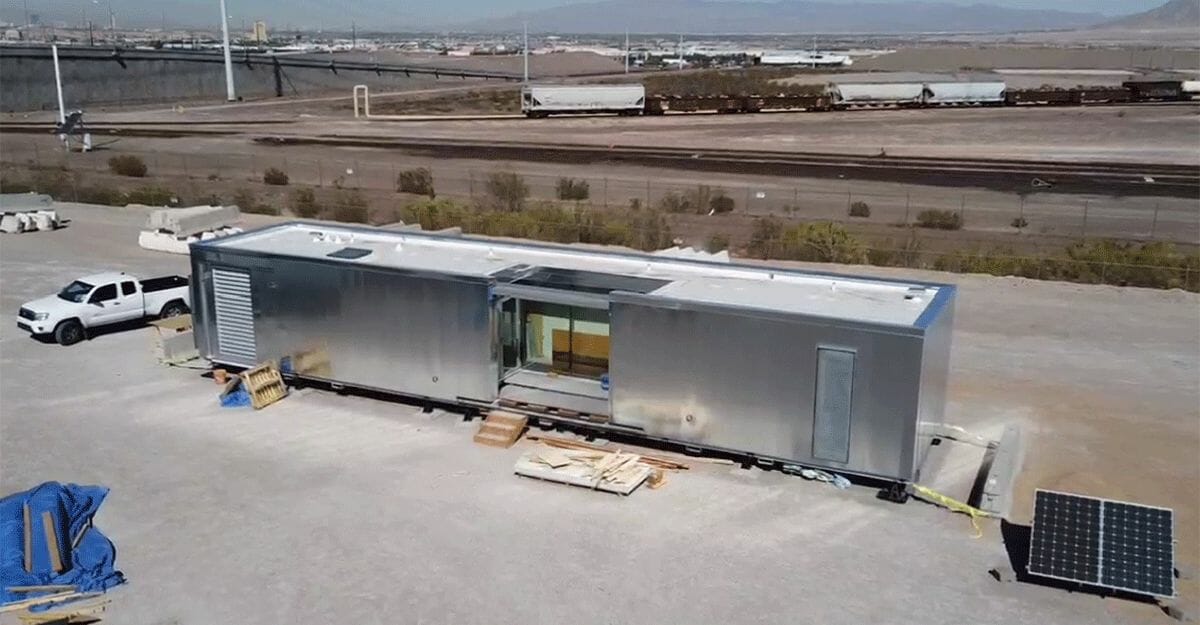Modular Research and Real World Results

Dr. Jin Ouk Choi is an Assistant Professor of Civil & Environmental Engineering & Construction at the University of Nevada, Las Vegas (UNLV). He has research and industry experience in modular construction, standardization strategy, construction engineering, and construction management.
Dr. Jin Ouk Choi has published dozens of academic articles and conducted numerous research studies on modular construction. He’s an academic advisor for the Construction Industry Institute’s [CII] Modularization Community for Business Advancement.
Choi says many stakeholders don’t fully understand the differences between modular and conventional construction. “It sounds very simple and obvious. But, on a modular project, there are so many things that need to be planned and executed differently from conventional construction,” he says. “Many failed modular projects showed that they have failed to execute their modular projects differently or implement the critical success factors.”
Some of Choi’s research has investigated the links between “modularization Critical Success Factors and performance of industrial modular projects.” A Critical Success Factor (CSF) is defined as something necessary for achieving success on modular construction projects. Choi and his colleagues have identified 21 CSFs.
An article co-written by Choi, which appeared in the Journal of Construction Engineering and Management, describes the five most important CSFs as follows:
- Module Envelope Limitations: Preliminary transportation evaluation should result in understanding module envelope limitations.
- Alignment on Drivers: Owner, consultants, and critical stakeholders should be aligned on important project drivers as early as possible in order to establish the foundation for a modular approach.
- Owner’s Planning Resources & Processes: As a potentially viable option to conventional stick-building, early modular feasibility analysis is supported by owner’s front-end planning and decision support systems, work processes, and team resources support. Owner comfort zones are not limited to the stick-built approach.
- Timely Design Freeze: Owner and contractor are disciplined enough to effectively implement timely staged design freezes so that modularization can proceed as planned.
- Early Completion Recognition: Modularization business cases should recognize and incorporate the economic benefits from early project completion that result from modularization and those resulting from minimal site presence and reduction of risk of schedule overrun.
Choi says many stakeholders don’t fully understand the differences between modular and conventional construction. “It sounds very simple and obvious. But, on a modular project, there are so many things that need to be planned and executed differently from conventional construction,” he says. “Many failed modular projects showed that they have failed to execute their modular projects differently or implement the critical success factors.”

Dr. Choi partnered with students from University of Nevada, Las Vegas to design and construct a net-zero home for the 2020 Solar Decathlon. The team placed third in the nation. Read more about the team's solar-powered entry below.
Education
Everyone from homeowners to major property developers need educating about modular construction, Choi says. “The public having the wrong impression of modular buildings — as being poor quality and too similar to one another — is a major barrier to the industry.”
But, perhaps even more importantly, students in architecture, construction management, engineering, and so on need to be educated about modular construction so that future modular projects have a greater chance of success. “Barely any architecture or engineering programs have courses on modular construction. Very few professors in the United States can teach it,” Choi says. His view is that the education system will continue teaching conventional, stick-building approaches until there is enough industry influence and investment. “Currently, people don’t have the necessary education in modular construction, which means training staff at modular companies and executing projects will take more time and be more costly,” he says.
As well as teaching students about modular construction, Choi also maintains the importance of primary research and innovation, with collaboration between industry and academia. “In the past, studies have mostly been limited to surveys, which identify perceptions of risks and advantages,” Choi says. “But we really need more rigorous, systemic, evidence-based studies.”
He has a call-to-action, a request to MBI to facilitate alliances between the modular industry and academia. “Industry alliances — similar to those at the CII, based at the University of Texas at Austin — can lead future generations into the industry with a positive influence for businesses.”
Related Listening:
Exploring the Critical Success Factors of Modular Construction w/ UNLV's Dr. Jin Ouk Choi
In this episode of Inside Modular, Dr. Jin Ouk Choi, assistant professor at the University of Nevada, Las Vegas, discusses his research into the critical success factors (CSFs) of modular construction projects and identifies the key CSFs that modular stakeholders should be utilizing. Dr. Choi also discusses the benefits large modular companies are seeing from incorporating these CSFs into their projects.
The Greatest Potential
Choi believes the residential sector — both multi- and single-family buildings — has the most potential for modular construction. Lack of housing supply is driving prices up so there’s very little affordable housing available, and the problem is not going away soon. “The construction industry doesn’t have enough workers to deliver enough houses to meet the demand and the labor shortage problems will last for a while, or even become worse.”
As a result, developers will be pushed to consider modular construction or even be forced to implement it, Choi says. “This will provide sufficient orders to GCs and fabricators to get the economies of scale that will really cut their prices. And that will be the tipping point for modular construction. I really hope all the stakeholders in the modular industry will be ready for that!”
Modular manufacturers “need to have sufficient knowledge and experience so they can provide the same or higher quality than stick-built homes at a lower price. They need the infrastructure, technology, and methods to mass-produce. And they also need to be able to provide sufficient variation or customization, especially for single-family homes,” Choi says. But he doesn’t think that’s too difficult for the industry to achieve. “In my view, just having some combinations of standardized designs, and being able to change the layouts, will deliver sufficient variation to the residential market. There are stick-building companies providing standardized but customizable designs.”

Seen here during its construction, "Mojave Bloom creates an oasis from the bustling downtown of Las Vegas and the Mojave Desert's harsh environment. Designed to be a place of healing for veterans suffering the effects of wartime trauma, the home connects the resident to their environment through a carefully orchestrated procession of sensory experiences," according to its website.
The Mojave Bloom Project
The Solar Decathlon is a two-year design-build competition run by the U.S. Department of Energy. First held in 2002, the collegiate competition involves 10 contests, challenging student teams to design and build high-performance, low-carbon buildings powered by renewable energy. In the United States alone, more than 25,000 students in 790+ collegiate teams have participated in the competition.
Choi was thrilled when the team from UNLV won third place for their entry, Mojave Bloom, a net-zero modular house. It was designed and fabricated from scratch by UNLV students at the Xtreme Cubes plant in Henderson.
Choi was asked to join the team as a subject matter expert in modular construction and construction management. He was co-principal investigator and co-engineering advisor for the team. “At any given time during the 2-year competition, we had more than 50 students working on the project. They were from different majors, including civil engineering, mechanical engineering, architecture, construction management, and computer science.”
On the Mojave Bloom project, Choi “implemented many new technologies, such as 4D scheduling with Procore, sensors, a drone, immersive virtual reality, 3D point clouds, LiDAR, and so on.”
The entire project was closely monitored and documented, and in his presentation at the 2022 World of Modular Choi will present the lessons learned, focusing on the results obtained from the innovative technologies. “The students did an excellent job, but I will talk about where the team made mistakes. New or inexperienced modular companies can learn from our failures and avoid them,” Choi says. “I think these stories will entertain the conference participants.”
About the Author: Zena Ryder is a freelance writer, specializing in writing about construction and for construction companies. You can find her at Zena, Freelance Writer or on LinkedIn.
More from Modular Advantage
AoRa Development Aims for New York’s First Triple Net Zero Building Using Modular Methods
More cities are providing funding for newer infrastructure projects as long as they meet sustainability requirements. This is how modular can fit the bill, thanks to its lower waste production.
Developers and Designers: Lessons Learned with Modular Design
Modular construction is attractive to many developers because sitework and module construction can occur simultaneously, shortening the schedule and reducing additional costs.
UTILE: Putting Modular Building on a Fast Track
In Quebec, UTILE is taking the lead in creating affordable modular buildings to help decrease the student housing shortage. During the process, the company discovered what it takes to make the transition to modular building a success.
Sobha Modular Teaches Developers How to Think Like Manufacturers
With its 2.7 million square foot factory in UAE, Sobha Modular is bringing both its high-end bathroom pods to high-end residences to Dubai while developing modular projects for the U.S. and Australia.
RoadMasters: Why Early Transport Planning is Make-or-Break in Modular Construction
In modular construction, transportation is often called the “missing link.” While it rarely stops a project outright, poor planning can trigger costly delays, rerouting, and budget overruns.
Navigating Risk in Commercial Real Estate and Modular Construction: Insights from a 44-Year Industry Veteran
Modular projects involve manufacturing, transportation, and on-site assembly. Developers must understand exactly what they are responsible for versus what they subcontract. Risk advisors should research the developer’s contractors, subcontractors, and design-build consultants—especially the modular manufacturer.
Art²Park – A Creative Application of Modular and Conventional Construction
Art²Park is more than a park building—it’s a demonstration of what modular construction can achieve when thoughtfully integrated with traditional materials. The use of shipping containers provided not only speed and sustainability benefits but also a powerful structural core that simplified and strengthened the rest of the building.
Building Smarter: A New Standard in Modular Construction Efficiency
Rising material prices, labour shortages, expensive financing and tightening environmental rules have made conventional construction slower, costlier, and more unpredictable. To keep projects on schedule and within budget, builders are increasingly turning to smarter industrialized methods.
Resia: Breaking All the Rules
Resia Manufacturing, a division of U.S.-based Resia, is now offering prefabricated bathroom and kitchen components to industry partners. Its hybrid fabrication facility produces more precise bathroom and kitchen components (modules) faster and at lower cost than traditional construction. Here’s how Resia Manufacturing does it.
How LINQ Modular Innovates to Bring Modular To The Market in the UAE and Beyond
LINQ Modular, with an office and three manufacturing facilities in Dubai, is a modular firm based in United Arab Emirates. The company is on a mission: to break open the housing and construction markets in the Gulf Cooperation Council (GCC) area with modular.










